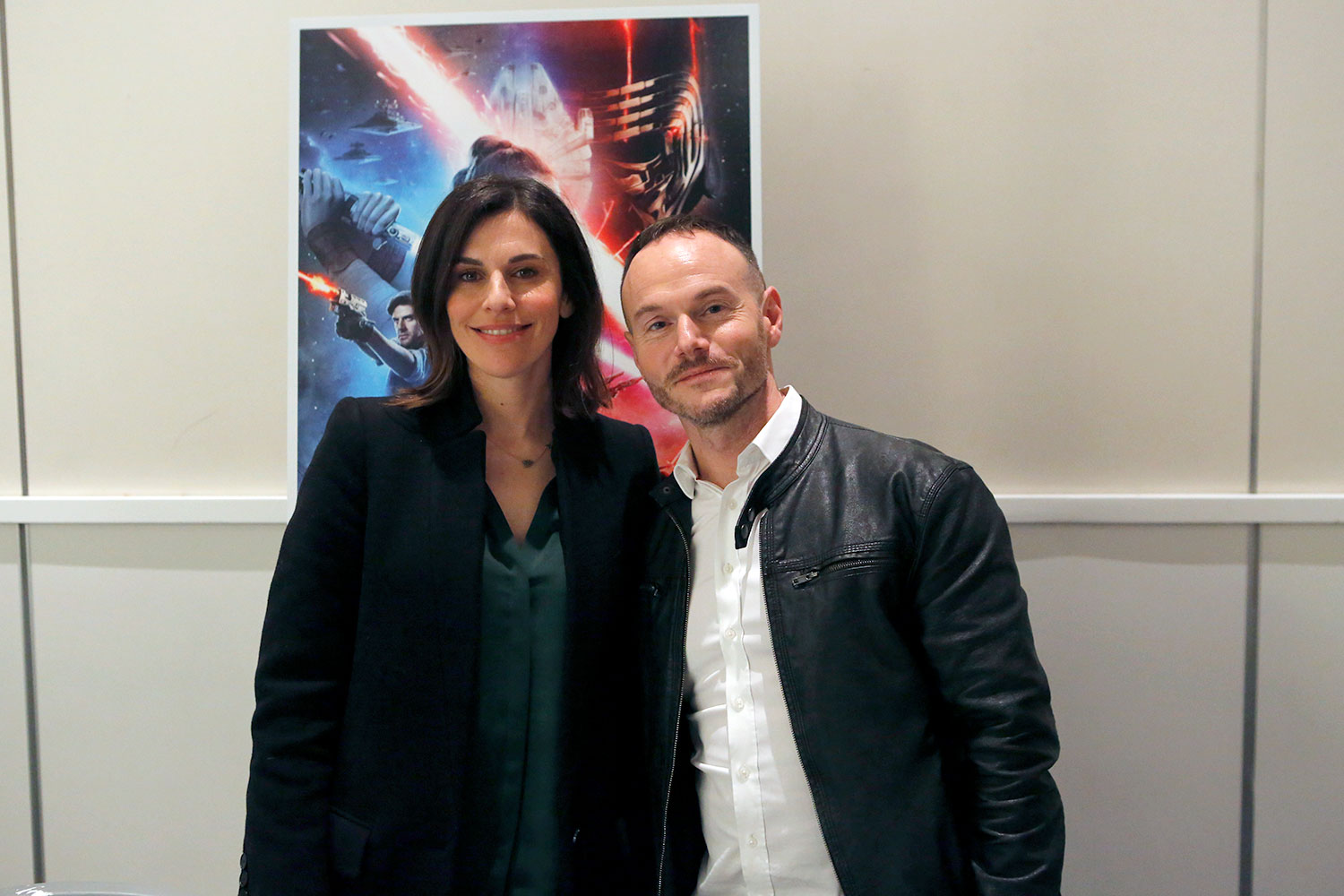 David Yeh
David Yeh Wrapping up a nine film saga is no easy task. But that duty had to fall onto someone. For The Rise of Skywalker, it was Chris Terrio, the Oscar winning screenwriter behind Argo, who got the call to co-write the story along with returning director JJ Abrams. For JJ, he’s said in other interviews that the benefits of coming into it following Rian Johnson’s The Last Jedi is that all of the characters were separated and can now finally come back together again. But it requires a lot more than that to tell a great story. We were able to sit down with writer Chris Terrio and Producer Michelle Rejwan (who is also Senior Vice President, Live Action Development & Production at Lucasfilm) to chat all things Star Wars. Yes, we did bring up Colin Trevorrow’s treatment of the story and a few other things. And don’t fret, no spoilers will be found in this story.
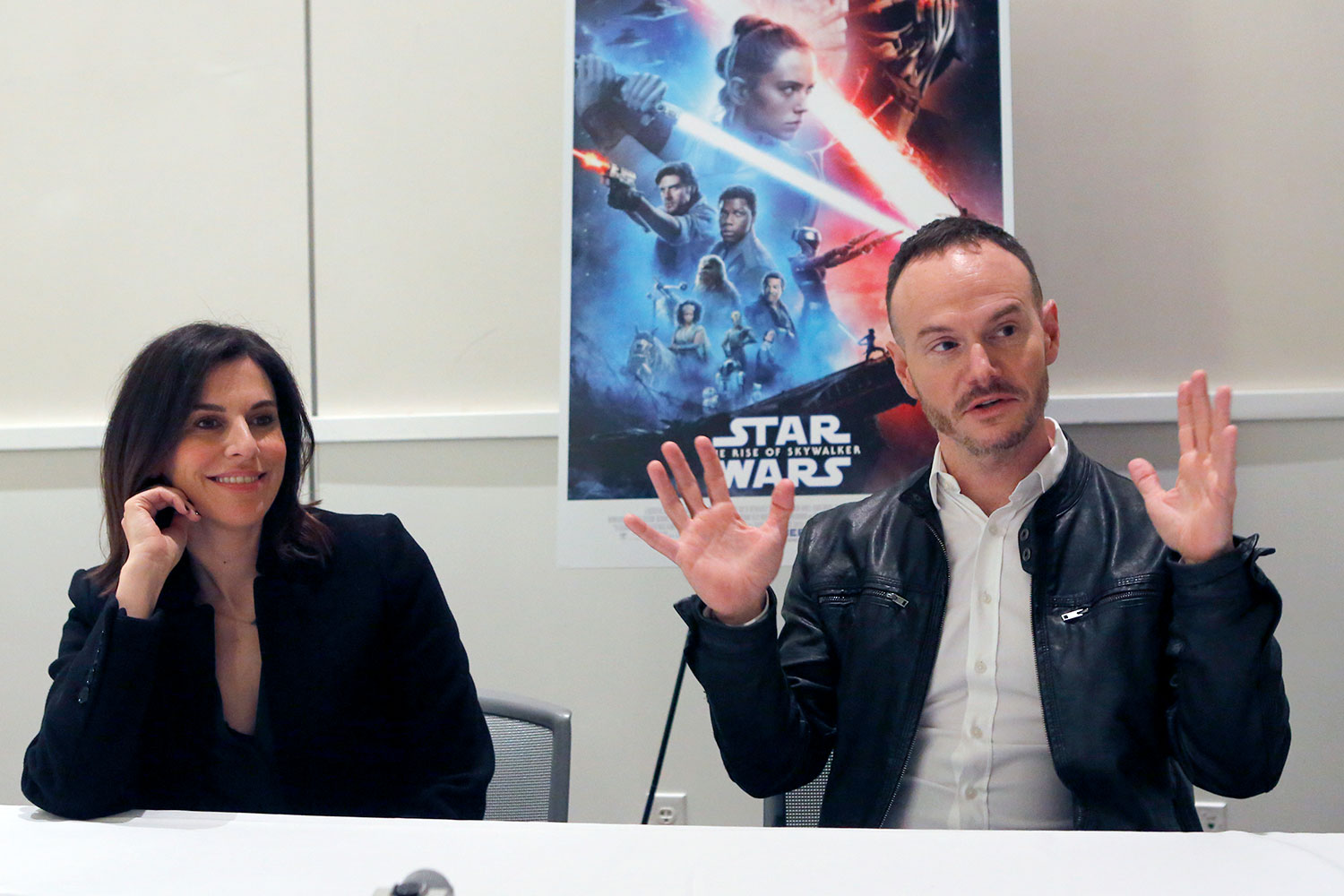
On Colin Trevorrow’s treatment
Chris Terrio: I didn’t read it. That was the best way to do it because if you don’t read it, then you don’t have it in your subconscious – ideas that are coming from other places. JJ really wanted to start from scratch.. not entirely from scratch, but just using Episode 7 and 8, so we just decided that we were going to tell the story that we thought should be the story coming out of ‘Episode 8’. I’m superstitious that if I read something, I’m afraid that I might get it lodged in my head and I might do something that way, so the strategy was to try to do our own thing.
On writing for so many characters
Michelle Rejwan: We really worked very hard to make sure that every character had an arc. It’s a lot to juggle. It was very important to us because we are so invested and care so much about these characters that we spent two movies with and in some cases more than that… and the new characters we wanted to be relatable and grounded in their own right – and rooting for them in the space that we had, but it was something that we talked about quite a bit.
Terrio: And also just entrances. Michelle and I both feel like the first ten-thirty seconds we spend with the character is the moment when you bond with the character. Think about the moment you meet Lando (in Empire) where he walks up to Han and then the minute that you realize he’s actually going to hug him, you fall in love with Lando. So we were really careful about the entrances of our characters and try to make you bond with them right away.
On Humor in Star Wars
Terrio: So much of humor is rhythm, I think, and that’s something I learned even before I had any dreams of doing Star Wars from Larry Kasdan’s writing. Larry Kasdan is so in the Han/Leia scenes and even into Jedi…
Rejwan: That wit.
Terrio: Yes, the wit and rhythm. In fact, when I was doing Argo, I thought so much about that scene in the tunnels with Han and Leia. There’s a lot of scenes in the hallways and moving people having rhythmic conversations in Argo, so I looked up to Larry my whole writing life, and so I was very conscious of the rhythm of the way people talk. And then when you get Oscar [Isaac] in the room with John [Boyega], and obviously Daisy [Ridley] and Anthony [Daniels] together in a group and then you add in elements like Naomi [Ackie] and Kelly [Marie Tran] and Joonas [Suotomo], you can’t fake it. They just have this natural alchemy… it’s like, we were doing Argo and Ben Affleck and Bryan Cranston, they have this thing. They just have this ‘music’ that they have together and when you add in Alan Arkin to that, the three of them have this ‘music’ and I haven’t really heard that music from actors again on something that I’ve worked on until this. On this, you just felt that when they were talking they found each other’s energy.
On Easter Eggs in the Writing
Terrio: Oh there are many! There are so many but I can’t really say what they are yet. And there are, of course, easter eggs for fans. Hopefully not ones that are distracting and hopefully ones that will become clear on the second or third viewing. They’re just things that we felt had some meaning to the galaxy, to us, and to George [Lucas]. Every frame, everywhere you look, I think there’s so much care and love… I can honestly say that everywhere in the script and every frame is full of references and allusions to Star Wars.
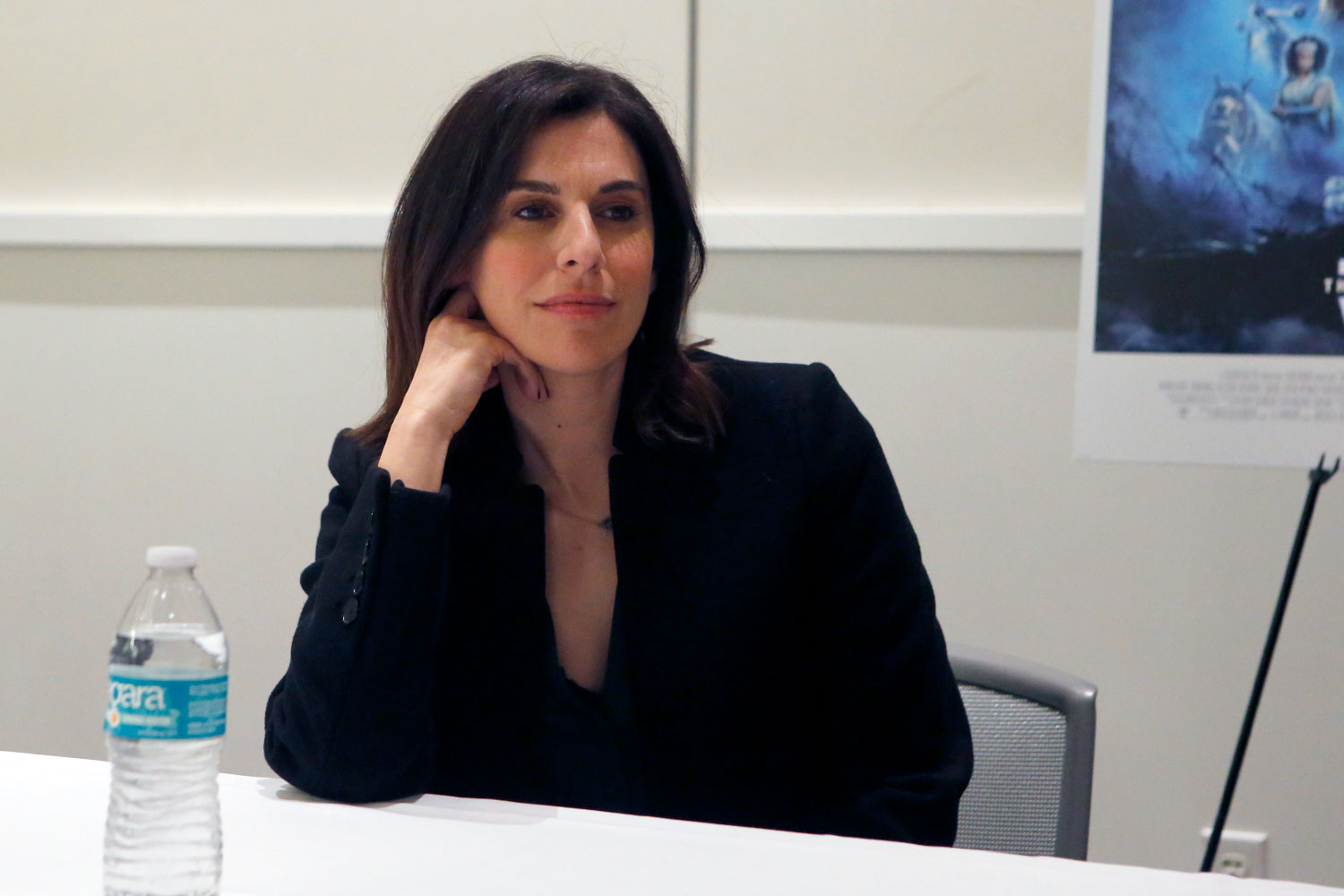
On Cameos
Rejwan: Ooh, I can’t speak to that.
Terrio: Yeah, I can’t speak to that yet.
On Reverse Engineering Carrie Fisher into the Story
Terrio: That’s the right way to describe the challenge. Because you have these nuggets and scenes, and some of them are just good lines that you just dream of hearing Leia say. And every time you look at a line, you know that these are among the last words you’ll ever hear Carrie say on screen. So you want them to have meaning and yet you don’t want to lose the sense of Carrie’s wit and her funniness – so you don’t want every line to be some grand pronouncement. You want to also keep a little bit of the improvisation and masochistic Carrie wit she would deliberately bring to a role. That twinkle in Leia’s eye, that free energy that Carrie had. So I think there are scenes where you’ll feel that but you’ll also feel the gravity – we’re learning much more about Leia, we’re learning from Episode 8, and we’re learning even more here about where she’s been and where she is. But it is a challenge to try to keep the intentions of what Carrie’s choices in the scene were because we didn’t want to be engineering her into scenes where you don’t feel that Carrie has made certain acting choices but then is betrayed by completely changing the context. So the scenes were written to be very much in the context of what The Force Awakens scenes were. And yet, the circumstances around them are needfully changed for this.
On Star Wars being Child-Friendly
Terrio: JJ can be so childlike anyway, and not in a pejorative way. JJ walks into a room and his eyes grow bigger than anybody else’s. If there’s a new alien or a new ship or something, JJ is going crazy.
Rejwan: He is like a kid, he’s so excited about those things. It’s very authentic and it feels very much in the DNA of who he is so it comes out very organically.
Terrio: There’s a character in the film that is an alien creature design which JJ always loved and I think that Michelle and I didn’t even realize, until kids came to set, the way kids would react to that character. Their eyes just lit up and they screamed when they saw the character up on the monitor. And then we had a whole new appreciation of how JJ could see a scene the way a kid could.
On George Lucas’ imput
Rejwan: We met with him early on and we were really taking in his thoughts. It was a great conversation.
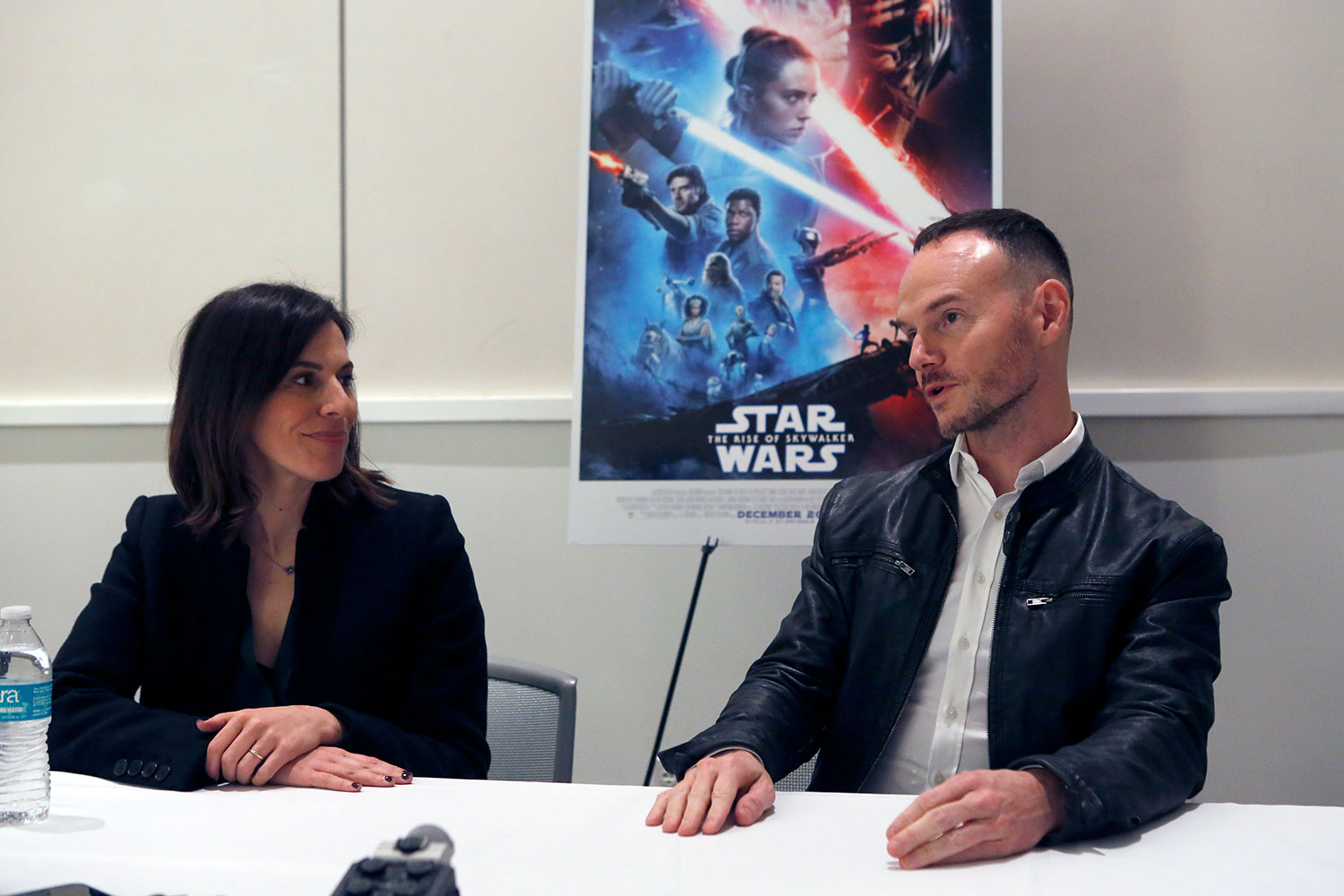
Were character Spinoffs in mind when writing?
Terrio: We really didn’t think about that so much because we wanted everyone’s arc to feel complete in this film. There are plenty of existing characters and characters in this that I would of course totally sit and watch a series about but we didn’t really have those conversations. We felt everyone had to get to the place where they needed to be at the end of this movie. The ending of a story just depends on where you decide to stop telling it, right, which is a big meta idea for us. If I say I got hit by a car, then that’s a very unhappy ending. If I got hit by a car, went to a hospital and met my wife there, then maybe the story has a different ending. And that was a thing we talked about a lot in the new film because the original trilogy ends and has a happy ending, but we go into The Force Awakens, and you realize the galaxy is still a bit messed up and the First Order has risen, you know the story hasn’t quite ended yet. So we wanted to write a somewhat definitive ending to Episode 9 even though we’re sure if we kept on telling it, it would go in different directions.
Where does the focus go with such a large cast?
Terrio: It’s a tough one because in a way, the new generation has to take over the films. This movie is very much about this generation and whether this generation can accomplish the things that the previous generation did. Having grown up with the Original Trilogy, of course I’ll say, “well, can’t we talk a little bit more about 3PO or Lando?”, you know my natural affinity goes towards these characters who are like my family, who I’ve grown up with and love. But in this film if there had to be an emphasis it fell on these new characters who we still have so much to learn about and getting to see them on this adventure, so they’re learning about each other, and we’re learning about them. So even though it’s a culmination of nine movies, it’s more of a culmination of the new sequel trilogy.
Working with the Star Wars Story Group
Terrio: We would have conversations with all the time with Pablo Hidalgo. I have him on a continuous text conversation and I’d say “I think I want to use this word, has this word ever been used in Star Wars?” or “Okay, we have this idea, is it totally crazy?” or “I can’t quite remember if this was ever done in Clone Wars…” so we had a good, open relationship with them. JJ wanted this film and its story to be its own thing, so we had autonomy really but we’d always have the story group within reach and I think we had a really good relationship with them. If Pablo or the story group isn’t bothered by something we’re doing, we take that as probably most fans won’t be bothered with it either. But sometimes he would push back and say “nope, don’t do that” or “terrible idea” or whatever and the nice thing about this group is that we were open enough to tell each other “terrible idea”. Because the worst thing, especially in a movie of this size is when someone were afraid to tell me that’s a bone headed idea, it would make a really bad movie.
On Creating D-O
Terrio: I think the origins of D-O, JJ and I were talking about BB-8, and I was comparing D-O to my dog, Charles. And his brother was a younger dog, George, that just looked to him because for how to behave and how to act like a dog, because he really didn’t understand how to act like a dog. So George would always look to Charles and weirdly that feeling, and you’ll see that D-O has a specific story in the movie but that’s the kind of feeling that created D-O. And almost everything in this movie came from a personal feeling. There’s no corporatocracy that says you have to do X or you have to do Y. The studio would give us so much freedom because they trust JJ, Michelle, and Kathy, and so they said “you guys go play, you do what interests you”. And again, JJ’s little kid-like personality would go “Oh my God, wouldn’t it be cool if we had a unicycle droid?” And once we marry that to a story idea, suddenly the characters evolve. But each one of the characters comes from a specific emotional or story-related thing we wanted to explore.
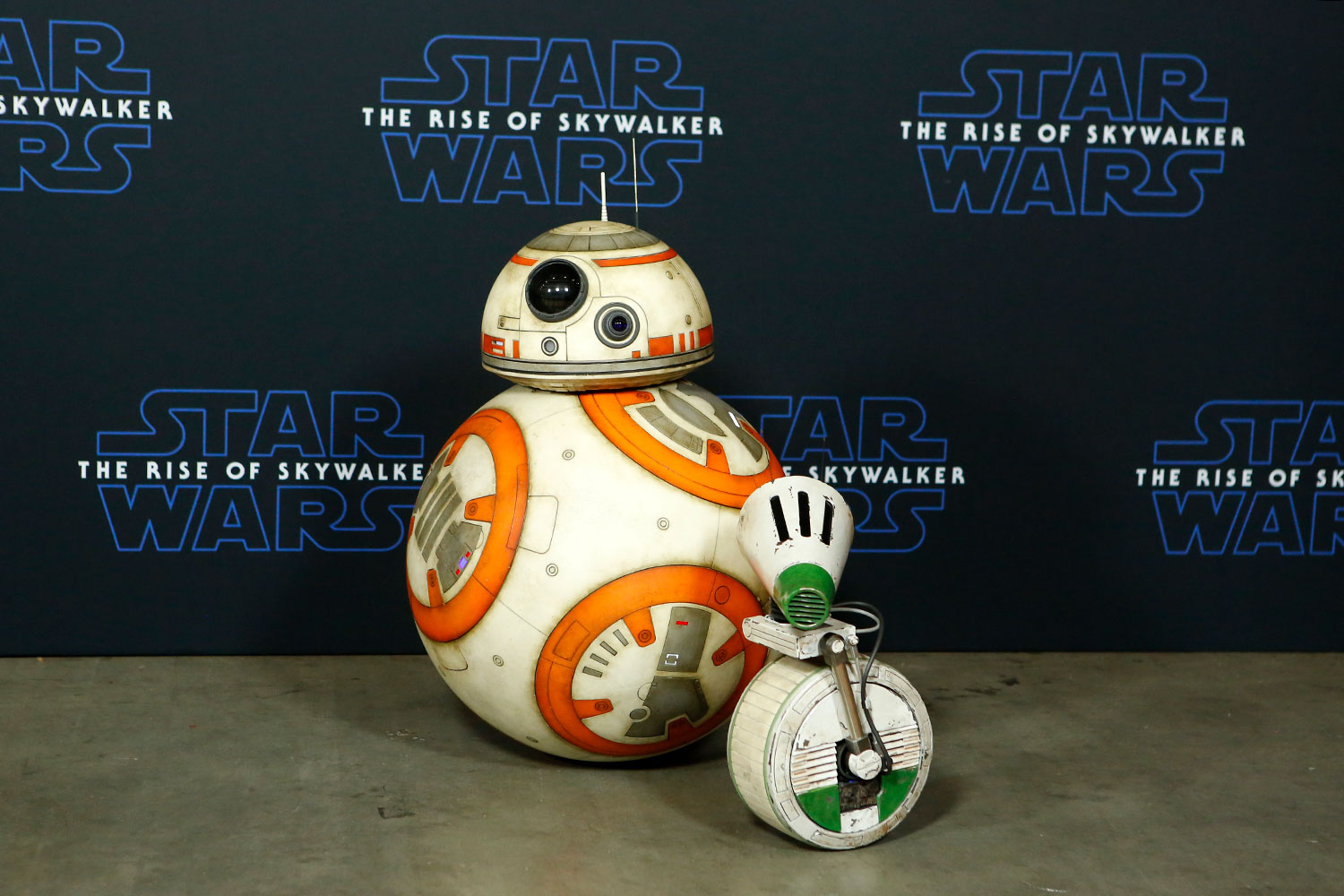
On the hardest things to write
Terrio: Beginnings and Endings. There’s always a part that’s harder than the other and the beginning of the film and the end of the film, wrapping up the nine movies, but also JJ and I talked about this many times, JJ has said when you leave Empire Strikes Back, there’s a very natural jumping off point. There are very specific things we want to know coming out of Empire Strikes Back and so we needed to make sure we hit the ground running on this and immediately jump into things that we want to know. So we had to be really careful about what we picked up from ‘8’, there were unanswered questions, and what things were, and new things we wanted to put into play immediately. Because the other thing about Star Wars, as George always said in the beginning is that you just want to be dropped into the action. The crawl is there to catch you up, but it’s in the tradition of serials, and so sometimes the difficulty of the beginning is to know how much exposition you create and how much you just want to say “don’t worry, you’ll catch up, you’re in good hands.” Which, George used to say in the case of Samurai movies, is that you don’t explain all the samurai rituals, you just drop us into them and we’ll be curious enough to want to understand them.
On The Force in Episode 9
Terrio: Did it pass the Star Wars test of feeling? That’s the thing about The Force. We use this word about the Force is that it’s an ‘instinct’. And so not only is the Force almost ‘trust your instincts’, not only do we talk about the word instinct about how we think about the force but how we write about the Force. We immediately know if it feels like it is within the realm of The Force as we know it and if it feels true to the original trilogy, although we did try to expand what that means. Even the Jedi don’t understand completely and have questions about the Force and there are mysteries about the Force that even the greatest grand master Jedi might not understand. So the Force is kind of a mystery to the characters and it’s a mystery to us but we sort of feel it out as we go along.
When did you realize it was finished?
Terrio: Is it finished? There was a moment when JJ and I were agonizing over something in the third act. And we were in a room with JJ and Kathy and Michelle Rejwan, and we couldn’t seem to get it. And we went outside the room and Rick Carter, our production designer said “I think the reason that you and JJ can’t write this scene is because you don’t want Star Wars to end.” And I looked at JJ and we knew he was right. And then we had to go and write it.
Star Wars: The Rise of Skywalker arrives in theaters December 20, 2019
Photography by David Yeh